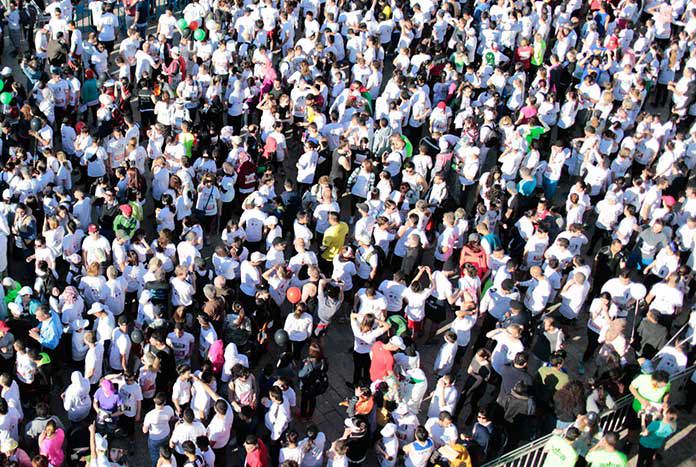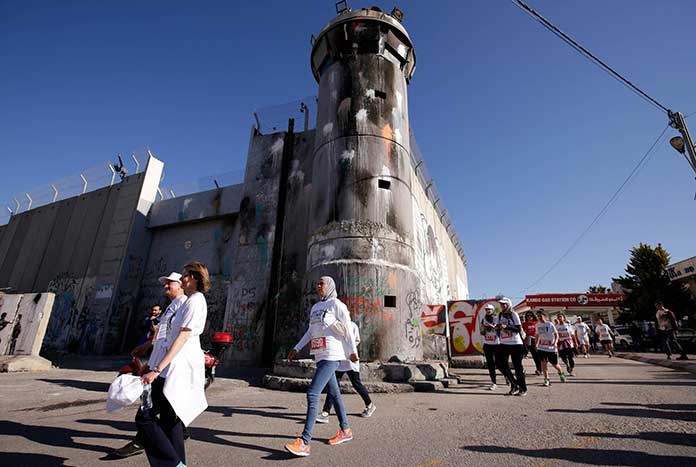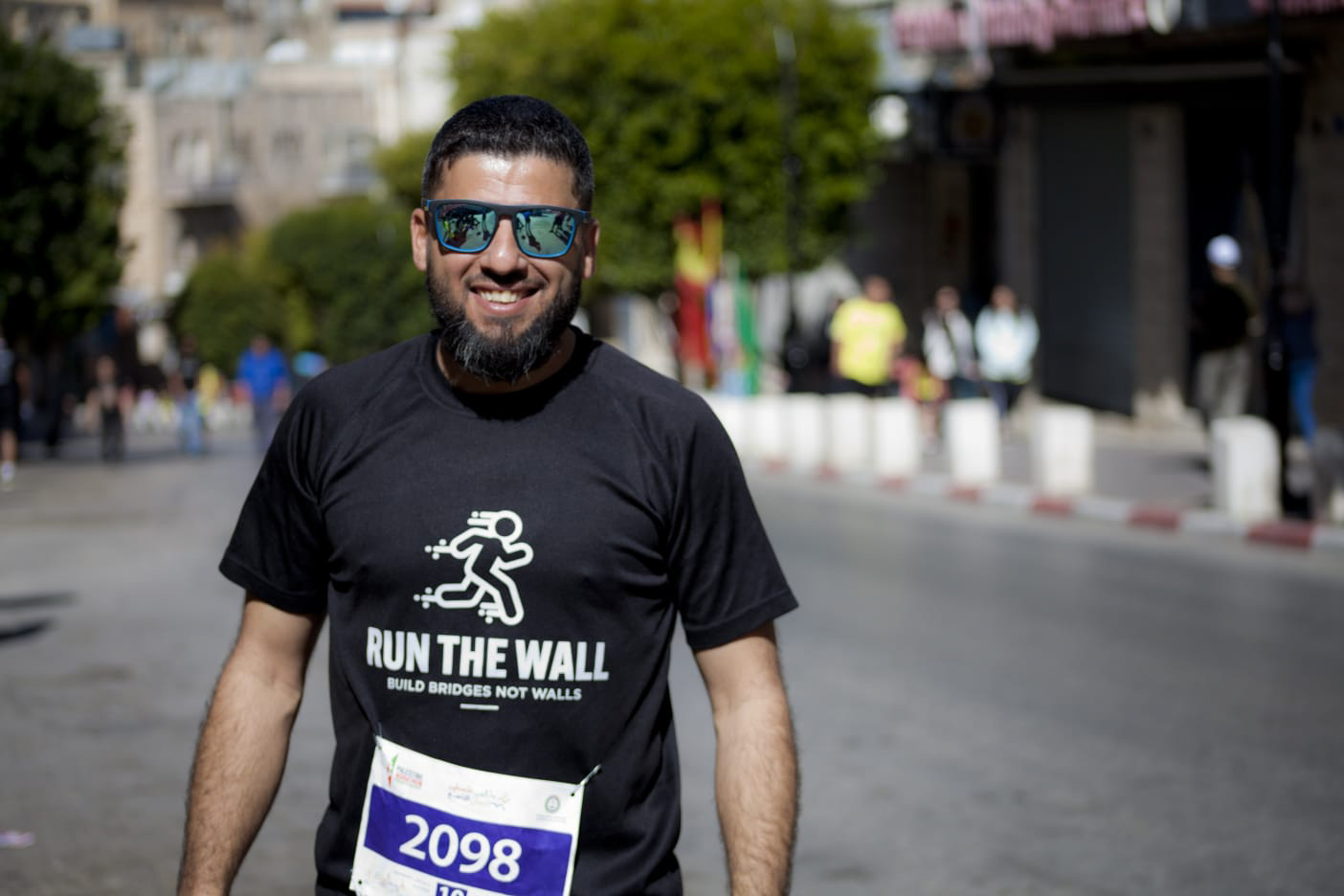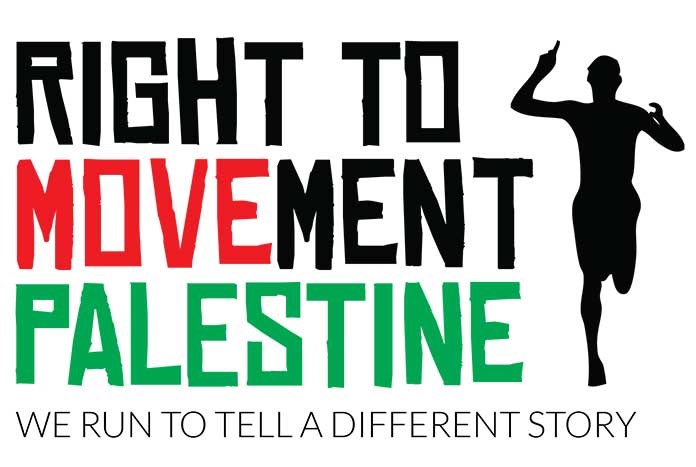
1. Where do I find help to promote Run The Wall?
Visit our Tool Kit page for publicity materials, digital assets and everything else you might need to participate in and promote Run The Wall.
2. Why is it called Run the Wall?

On Your Marks, Get Set...
A crowd of runners gather at the start of the Palestine Marathon in Bethlehem
— — — — — —
We started Run The Wall in 2021 with our Palestinian friends, Right To Movement, when the Palestine Marathon was cancelled because of COVID-19. It is now an annual event and each year, we invite people from around the world to run for Palestine on the same weekend as 10,000 people participate in the Palestine Marathon in Bethlehem in the Spring.
On Friday 25th April, 10,000 Palestinian runners were due to be pounding the streets of Bethlehem for the 10th annual Palestine Marathon. However, the marathon has been postponed due to the current situation in the West Bank, so it’s more important than ever that we run in solidarity with our friends in Palestine over the same weekend.
“The camaraderie and spirit of inclusion were palpable on the global Run The Wall WhatsApp group. I especially felt connected to Palestine, seeing and hearing from those running the Wall for the right to movement.” Natasha Singh Ally, South Africa who ran the Wall in 2021, 2022 and 2023
3. What is unique about the Palestine Marathon?

Unique: Marathon runners in Bethlehem walking alongside the illegal Separation Wall as part of the Palestine Marathon
— — — — — —
In April 2013, Amos Trust took a team to Bethlehem to run the first Right To Movement Palestine Marathon. Since then, we have brought people to run in solidarity with Palestinians, to demand their freedom of movement and to raise funds for our partners in Gaza and on the West Bank.
The route of the Palestine Marathon in Bethlehem is shaped by the 8-metre-high Separation Wall. At times, participants run alongside the Wall; at other times, it forces people to turn back and run in a different direction.
As there are not 26 miles of contiguous Palestinian state, runners start in Manger Square, run 6.5 miles to the edge of the Palestinian-controlled areas, and then go back to complete a half marathon. To do the full marathon, you have to run this route twice.
While a small number of people run the full and half marathon, thousands participate in the 10km challenge and 5km family run. The Palestine Right to Movement Marathon has become a celebration of life in an occupied, hemmed-in town.
4. What is the Separation Wall?

Apartheid Wall: Cutting deep into the West Bank, denying communities access to their land, denying them the right to movement
— — — — — —
Work began on the Israeli Separation Wall in 2002. When completed, it will be 750km long. The Wall — also known as the Apartheid Wall, the Separation Barrier or the Security Fence — has had a devastating impact on Palestinians. It cuts deep into the West Bank, denying communities access to their land, denying them the right to movement (under Article 13 of the Universal Declaration), and stopping any effective dialogue.
The Wall consists of 8-metre-high concrete panels in urban areas around Bethlehem. Elsewhere, it combines electric fences, razor wire, military access roads, bypass roads and watchtowers.
In 2004, the International Court of Justice issued an advisory opinion stating that Israel’s Separation Wall was illegal, violated international law and should be dismantled. It also recommended that the Palestinians affected be fully compensated.
The Separation Wall is the most visible aspect of Israel’s ‘Matrix of Contol’, which, together with the massive expansion of the illegal Israeli settlements, the building of Israeli bypass roads, the policy of home demolitions and land confiscations, make it apparent to Palestinians that their land is wanted without the indigenous Palestinian population.
5. How will the money I raise be used?

Emergency: Food aid being delivered in Rafah, Gaza, thanks to generous donations to our Gaza appeal
— — — — — —
All money raised and donated via Run The Wall will support our emergency appeal for Gaza and the West Bank. Amos Trust has been working in Palestine for 30 years and has partners on the ground in both Gaza and the West Bank.
Read more about our emergency appeal, the current situation and how money is being spent.

























